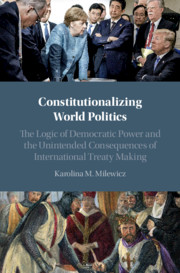 Constitutionalizing World Politics
Constitutionalizing World Politics from Part II - The Logic of Democratic Power in Treaty Making
Published online by Cambridge University Press: 21 July 2020
The logic of democratic power is put to an empirical test in Chapter 6. Having identified treaties as the best observable source of international rules, this chapter tests the democratic power argument for international rule–based cooperation systematically in the context of international treaty making, which involves three stages – negotiations, commitment, and compliance. This statistical analysis is based on a dataset of seventy–five international treaties adopted between 1945 and 2008 and is complemented with insights from the International Covenant on Civil and Political Rights. The results reveal consistent and robust empirical patterns regarding states’ willingness and ability to cooperate over international treaties, which are generalizable across treaties, issues, and the stages of treaty making. The analysis confirms the centrality of the democratic powers as the chief promoters and adherents of international rules that gradually but inadvertently contribute to the constitutionalization of world politics.
To save this book to your Kindle, first ensure [email protected] is added to your Approved Personal Document E-mail List under your Personal Document Settings on the Manage Your Content and Devices page of your Amazon account. Then enter the ‘name’ part of your Kindle email address below. Find out more about saving to your Kindle.
Note you can select to save to either the @free.kindle.com or @kindle.com variations. ‘@free.kindle.com’ emails are free but can only be saved to your device when it is connected to wi-fi. ‘@kindle.com’ emails can be delivered even when you are not connected to wi-fi, but note that service fees apply.
Find out more about the Kindle Personal Document Service.
To save content items to your account, please confirm that you agree to abide by our usage policies. If this is the first time you use this feature, you will be asked to authorise Cambridge Core to connect with your account. Find out more about saving content to Dropbox.
To save content items to your account, please confirm that you agree to abide by our usage policies. If this is the first time you use this feature, you will be asked to authorise Cambridge Core to connect with your account. Find out more about saving content to Google Drive.